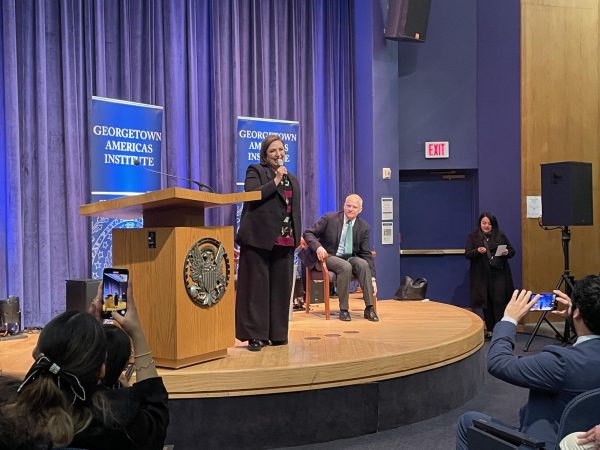The opposition candidate in the Mexican presidential election visited Georgetown University as part of her U.S. tour to discuss the biggest issues facing Mexico Feb. 5.
Xóchitl Gálvez, a former mayor and senator, is the main candidate opposing the incumbent party, the National Regeneration Movement (MORENA). While current President Andrés Manuel López Obrador (AMLO) cannot run for reelection, Claudia Sheinbaum, MORENA candidate and former head of government of Mexico City, is widely expected to win.
At the event, hosted by the Georgetown Americas Institute, Gálvez focused on the issues of security, gang violence, militarization and renewable energy.
Gálvez said she was running because the country is going in the wrong direction under the current administration.
“I am here because I am not happy with what is happening in Mexico. 150,000 people killed under this administration does not speak well of our security policy. ‘Hugs and not bullets’ was a failure. The health system is devastated, public insurance was ended,” Gálvez said at the event.
“We have a serious problem in the countryside with a prolonged drought that has left farmers in poverty. We have a problem of migration with the United States, a product of bad understanding between these two countries that have not known how to address migration in an adequate way,” Gálvez added.
Gálvez said she refutes the narrative that she cannot win, which has been pushed by President AMLO, instead opting to talk about her experience rising to business success out of poverty.
“The president is not the one who has to accept the results, it is the Federal Electoral Tribunal who has to accept the results,” Gálvez said. “I believe that we will win by a wide advantage, even though the President gets so angry because he says, ‘How did she go from selling jellies and tamales to becoming a successful businesswoman?’”
Gálvez began public service as the director of the National Institute of Indigenous Peoples in 2003, leaving her career as a technology entrepreneur. She was elected mayor of Miguel Hidalgo, a borough of Mexico City, in 2015 before being elected to the Senate in 2018.

Gálvez said her determination and resolve to continue through challenges in her studies to become an engineer allowed her to find success.
“To have been born where I was born, to have grown up in violence, in poverty and in the lack of opportunities, I became a strong, courageous woman. To live in Tepatepec and sell jellies and tamales before becoming a successful woman, I say that if you put in a lot of effort, studying and working like this, dreams come true. I never imagined being here where I am,” Gálvez said.
Gálvez focused on the issue of security, discussing the ongoing fentanyl crisis and its associated gang violence. She said the United States and Mexico need to work together to develop innovative solutions, such as a joint customs agency, to prevent the fallout from gang violence, in particular among young people.
“What is happening to the youth in Mexico is truly painful. The main cause of death of youth in Mexico is homicide. And of the main causes of death of youth in the United States is overdose. We are suffering, as two countries, the loss of our young adults,” Gálvez said.
“We need to begin to solve problems by thinking out of the box, because if we continue thinking of the same solutions that we have used in the past 18 years, we will only aggravate the problem,” Gálvez added. “It seems the United States is worried about migration and fentanyl, but our relationship is a lot deeper than that. Today I proposed that we create a binational customs agency that allows both countries to work together.”
Gálvez condemned the militarization of the country, saying the use of soldiers could potentially violate the law and would not work as well as a national police force.
“I do not agree with the militarization of the country. The military has very specific functions in the Constitution. They will continue to provide support tasks in the field of public security until 2028, but in that time, once and for all, we have to make a good national civil police force, with the ability to collect intelligence, investigate and use technology,” Gálvez said.
Answering questions about how to address the security crisis, Gálvez said a national police force would be part of a larger campaign to restore peace.
“A good security strategy is using technology, control of the prisons, certification of the police, strengthening the justice system,” Gálvez said. “We need to see what crimes can be addressed with alternative justice and focus public ministries on those crimes that are causing harm to civilians.”
In response to an audience question about the transition to renewable energy and the use of fossil fuels in Mexico, Gálvez said renewable energy is needed now more than ever to reduce costs and also fight climate change.
“The future of the world is in electric energy, in renewable energy,” Gálvez said. “Mexico has great potential in renewable energies. Wind and solar power are much cheaper than energy that comes from fossil fuels, and what we have to do is establish ways of sending solar energy across the country.”
“You have to think about what planet future generations will live on,” Gálvez added.








